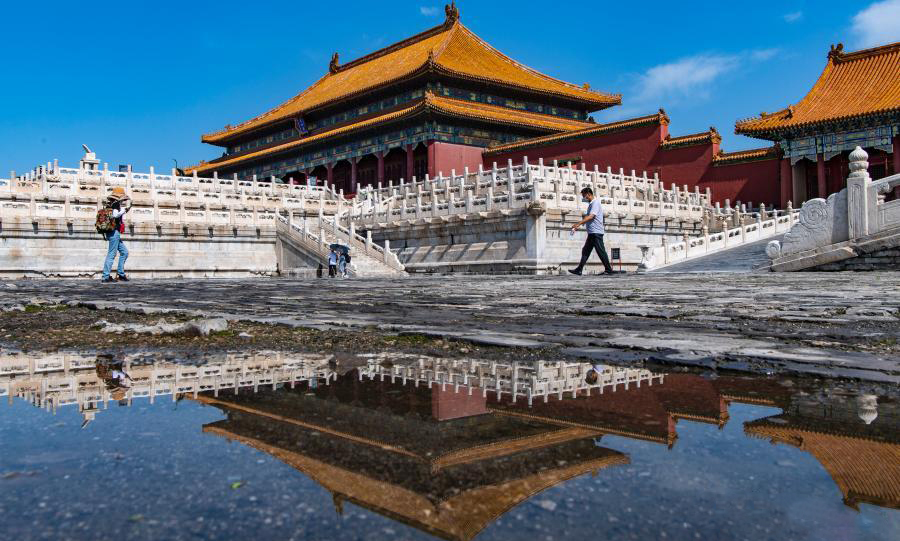Burgeoning homestay industry drives local economic development after becoming mainstay in China’s rural tourism sector
In recent years, China’s homestay industry has embraced vigorous development. The sector has played a crucial role in promoting employment, driving local economic development, and implementing the rural vitalization strategy.

Photo shows Chinese tourists at a homestay hotel in Sansha town, Xiapu county, southeast China’s Fujian Province. (Xinhua/Lin Shanchuan)
Homestay bookings in multiple localities in China have increased rapidly during the busy summer vacation season. Data from tujia.com, a leading Chinese homestay booking platform, indicated that the number of bookings for homestay hotels in the first week of July already accounted for 60 percent of the total number realized in the previous month, and 70 percent of the bookings were for family trips. The 10 most popular destination cities for homestay bookings during the summer vacation season are Chongqing, Chengdu, Changsha, Xiamen, Dali, Guangzhou, Beijing, Hangzhou, Shanghai, and Beihai.
The Beijing Municipal Bureau of Culture and Tourism began to give away consumption coupons worth no more than 30 million yuan (about $4.46 million) for tourism-related accommodation reservations in suburban Beijing districts on July 10.
The coupons can be used for bookings at nearly 10,000 hotels and homestay hotels in Beijing’s suburban districts. The maximum discount for a single order can reach as much as 50 percent, with the subsidy set at a maximum of 1,000 yuan per order.
During the first hour that the coupons were made available, booking volumes for lodgings located in the city’s Miyun, Changping and Tongzhou districts on Chinese online travel agency Qunar’s app rose by eight, seven and nine times, respectively, compared with previous days.
Liuba county in Hanzhong city, northwest China’s Shaanxi Province, has continued to build up its homestay industry in recent years.
To ensure that its homestay industry can keep up with the new development trends in the tourism sector, the county has allocated 10 million yuan in rewards and subsidies each year. It has also attracted private capital to further develop homestay and agritainment businesses. So far, it has granted 9.6 million yuan in loans for the development of rural tourism, in addition to issuing over 3 million yuan in loans for new business startups.
Meanwhile, the rapid development of the homestay industry has created jobs for many local residents. After receiving training, many farmers and migrant workers who returned home to the county have since become homestay staff.
Li Caiyun, a resident in Tianxingliang village, Huoshaodian township of Liuba county, turned her old house into an agritainment facility, and has been running an agritainment business for several years.
After taking part in a training session for homestay keepers, Li poured hundreds of thousands of yuan into turning her agritainment facility into a homestay hotel. Now, the homestay hotel brings Li more than 20,000 yuan per month.
Li’s success has inspired many other villagers to transform their own agritainment facilities into homestay hotels.
Since homestay hotels are mostly located in suburbs or rural areas, they have become an important option for those seeking leisurely excursions to suburban areas, which has become the main choice for Chinese tourists due to the ongoing COVID-19 pandemic.
People engaging in the tourism industry remain upbeat about the prospects of the homestay sector, as it enables visitors to enjoy natural scenery and local culture while meeting their travel demands.
A homestay hotel owner in Jingliyuan village, Miyun district of Beijing explained that many people in the village turned their agritainment facilities into homestay hotels in 2020. These homestay hotels can provide relatively better facilities and services that meet the travel needs of Chinese tourists. Most importantly, owners began to see the operation of homestay hotels as a viable career choice, which reflects their optimism about the prospects of rural industries, including the homestay sector, as well as their confidence in the consumption demand of Chinese tourists.
Photos
Related Stories
Copyright © 2022 People's Daily Online. All Rights Reserved.









